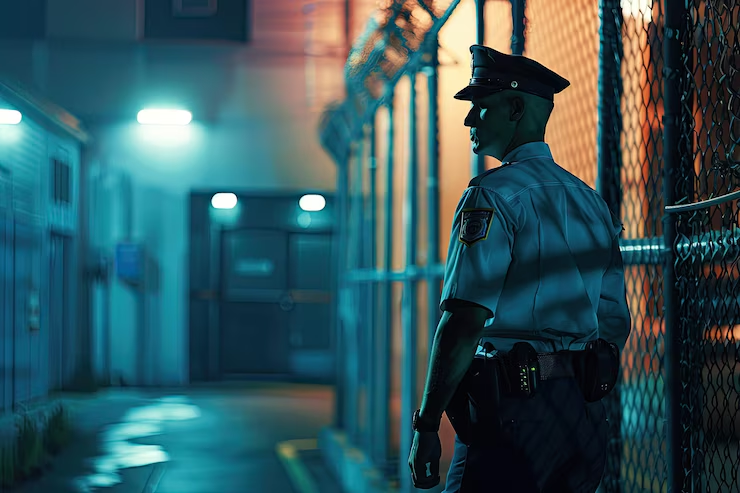Selected News
Night vs. Day: How Security Guard Duties Differ Based on Shifts

Security guards play a vital role in maintaining the safety and security of people and property. However, the specific duties of a security guard can vary depending on whether they work the day or night shifts.
This article explores the key differences between day and night security guard duties and highlights the unique challenges and responsibilities each faces.
Core Responsibilities: A Foundation for Both Shifts
While the specific duties might differ, both day and night security guards share core responsibilities that form the backbone of their work. These include:
1. Access Control: Checking identification, monitoring entry and exit points, and maintaining authorized personnel are on-site.
2. Patrols: Regularly walking or driving the premises to identify and deter suspicious activity. This includes checking for open doors, broken windows, and other potential security breaches.
3. Fire Watch: Depending on the location, security guards might be responsible for conducting fire drills and monitoring fire alarms to make sure safe evacuation procedures are followed during emergencies.
4. Reporting: Recording observations, incidents, and activities in a security log. This information is important for keeping a security record and identifying trends indicating potential issues.
5. Customer Service: Security guards, especially those in public settings, often provide customer service by answering questions, directing visitors, and de-escalating situations.
Shining a Light on Daytime Security
Daytime security guards typically deal with more foot traffic and activity. Their duties might involve:
1. Managing Deliveries: Verify delivery schedules and ensure secure receipt of packages.
2. Interacting with the Public: Responding to inquiries and requests from visitors, employees, and customers.
3. Crowd Control: Managing queues, directing people to specific areas, and ensuring order in busy locations.
4. Loss Prevention: Monitoring for potential theft or shoplifting activities in retail environments.
5. Building Security Checks: Make sure doors and windows are secure before business hours begin.
Nighttime: A Different Kind of Watch
Night security guards face distinct challenges due to the reduced visibility and lower activity levels. Their primary focus often shifts towards:
1. Intensified Patrols: With fewer people on-site, patrolling becomes essential to deter trespassers and identify potential break-ins.
2. Alarm Response: Night guards often act as the first responders for security alarms. They must assess the situation, contact emergency services when necessary (like those offered by Sentry Security Services), and take appropriate action to secure the premises until help arrives.
3. Monitoring Security Systems: Security guards must look for unusual activity in security cameras, access control systems, and fire alarms.
4. Maintaining a Secure Environment: Ensuring a quiet and safe environment for employees or residents still working or sleeping on-site.
The Importance of Situational Awareness
Regardless of the shift, maintaining high levels of situational awareness is crucial for all security guards. This includes:
1: Staying alert and observant of their surroundings.
2: Recognizing potential threats and taking appropriate steps to mitigate them.
3: Being prepared to respond to emergencies calmly and effectively.
4: Utilizing communication skills to report incidents and collaborate with law enforcement.
We Can Help
Sentry Security offers reliable alarm response services to meet your security needs, whether during the day or night. Our experienced team is prepared to manage the distinct challenges of each shift, keeping your property secure at all times.
For more information on our alarm response services or to discuss your specific requirements, contact Sentry Security at 314-867-1125 or visit our contact page.
 Sentry
Sentry